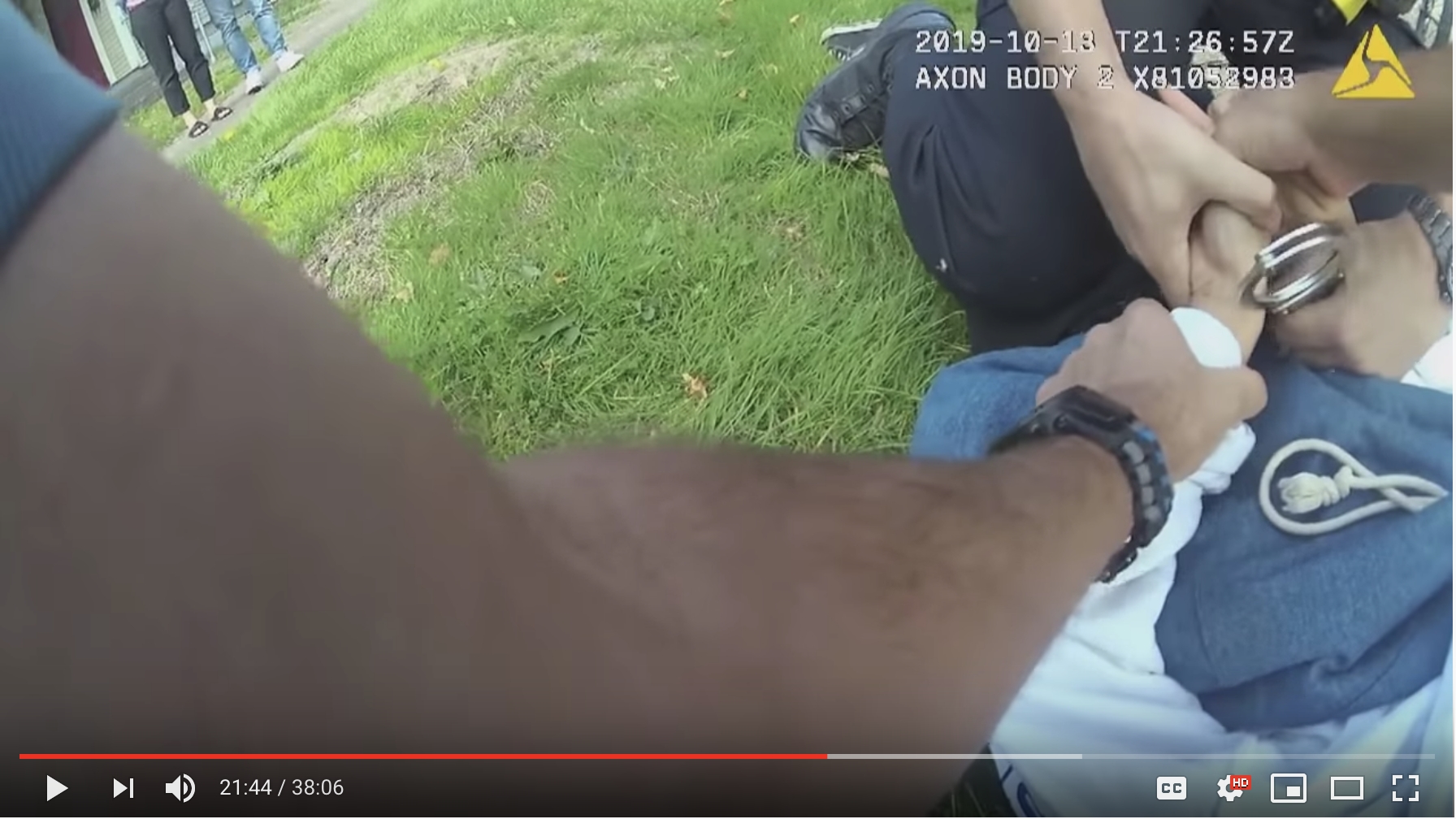This is the question raised by a recent traffic stop and arrest in Corvallis.
On October 13, Oregon State University student Genesis Hansen, 21, was alleged to be riding on the wrong side of the road, against traffic, when she was stopped by Senior Trooper Kelly Katsikis, an Oregon State Police bicycle patrol officer assigned to the University substation. Trooper Katsikis said that Hansen was in violation of the law by failing to drive within a lane. Expressing his intent to issue a warning for the violation, Trooper Katsikis asked to see Hansen’s identification.
Rather than provide the officer with her ID, Hansen asked Trooper Katsikis to show her the legislation that requires her to provide him with her ID. Trooper Katsikis then radioed for backup. Corvallis Police Officer Donald Sheldon arrived on the scene in response to the request for backup.
Hansen continued to disagree that she was in violation of the law, pointing out that she was riding on a narrow, two-way residential street with no yellow dividing line down the center of the roadway. Because there was no lane marker on the roadway, Hansen asked the officer to explain how she could be in violation of the law. She also repeated her request for the officers to show her the legislation that requires her to provide ID to the officers.
Trooper Katsikis insisted that Hansen was in violation of the law, and in the course of their disagreement, changed his mind about the warning and decided to issue her a citation instead. Trooper Katsikis continued to ask for Hansen’s identification, but instead of providing ID, Hansen continued to ask him to show her the law requiring her to produce ID.
Eventually, Trooper Katsikis gave her an ultimatum: “I need you to either give me your identification now or you are going to be under arrest. Do you understand that?” Hansen replied “I don’t answer questions.” Trooper Katsikis and Officer Sheldon then reached for her arms. Hansen was forced to the ground, with the two officers on top of her. The officers then turned her over, cuffed her hands behind her back, and placed her into a Corvallis Police Department vehicle. She was driven to Benton County Jail, where she was booked on misdemeanor charges of Interfering with a peace officer and Resisting arrest. She was then released on her own recognizance.
Genesis Hansen Arrest on 10/13/2019 – Oregon State Police body camera video
There’s a lot to unpack there, so let’s go back to the original traffic stop. In Oregon (and probably in every other state) the law requires vehicle operators to use the right side of the roadway except under certain circumstances. See ORS 811.295, Failure to drive on the right. The “right side of the roadway” is the side of the roadway to the right of the center line. This law is in effect whether or not a center line is painted on the roadway. So by riding on the left side of the road on a two-way street, Hansen would be violating the law.
However, the State Trooper was wrong about which law she was alleged to be violating. He was attempting to cite her for “Failure to drive within a lane,” which is the wrong statute. See ORS 811.370, Failure to drive within a lane. The law the officer was citing is very clear. It applies to “a roadway that is divided into two or more clearly marked lanes for traffic,” and there are no clearly marked lanes for traffic on that road.
So Hansen was absolutely correct on the law when she calmly said “Well, I think the reason that we’re disagreeing is because you have me failing to be in a lane, but I don’t see any lines on this road to begin with…so that’s why I think we have a disagreement about what the rule is and why I have to provide you with information.” That should have been the end of it right there. There was no violation of the law as stated by the officer.
Hansen could easily have resolved this mistake in court by contesting the ticket, and then arguing that she was not in violation of the statute for which she was cited. The road Hansen was stopped on is not divided into two or more clearly marked lanes, and on this point, Hansen was correct on the law, and the officer was wrong. Had she contested the ticket in court, she would have won on this basis alone.
- Related Article: How To Handle A Traffic Ticket
It is possible that a court might try to change the incorrect charge to the correct charge (Failure to drive on the right), once the court realizes that the officer is wrong on the law. But if a court does try to change the charge, that’s the time to disagree with the court, and insist that the charge be dismissed for failure to prove the case. If the police cite someone for the wrong charge, the case is over when they fail to prove their case, and they shouldn’t have a second bite at the apple after they lose in court. To keep this in perspective, it’s a minor traffic violation on a low-traffic residential street. The cyclist was wrong on the law, but so were the police, and the court should dismiss the charge, remind the cyclist to obey the law, and remind the police to write a ticket on the correct charge next time. Case dismissed.
But we never got there, because Trooper Katsikis gave Hansen an ultimatum: either produce ID or she would be arrested. He asked if she understood his ultimatum, and when she said “I don’t answer questions,” the officers placed her under arrest for Interfering with a peace officer, and subsequently, for Resisting arrest.
The traffic violation aside, this sequence of events raises additional, even more compelling questions: Can a police officer demand to see your ID on a traffic stop? Can you be arrested for a minor traffic violation? And depending on the answer to these questions, was the arrest legal?
Let’s start with the demand for ID. In Oregon, police are authorized to stop and detain a person for investigation of the violation, identification and issuing a citation. See ORS 810.410, Arrest and citation. Police are authorized to issue a citation for a traffic violation but are prohibited from making an arrest for a traffic violation. Police also have the authority to detain you until they establish your identity, and there is nothing to prevent police from asking you your name and even asking for proof of your identity.
However, you are not required to tell them your name, and you don’t have to provide ID. You aren’t even required to carry ID in Oregon. (Note however that you are required to have a valid driver’s license in your possession if you are operating a motor vehicle, and you are required to produce your driver’s license if you are stopped for a traffic violation or you are involved in a traffic collision while operating a motor vehicle and the officer requests to see your driver’s license. See ORS 807.570, Failure to carry or present license.) However, be aware: while you aren’t required to identify yourself, it is a Class A misdemeanor to falsely identify yourself. See ORS 807.620, Giving false information to police officer. So if you do choose to identify yourself, be truthful.
Trooper Katsikis attempted to get around the law by various means—he seemed to agree to show her the legislation that requires her to provide ID, but never actually did. He told her that it’s “customary” for people to “go along with the program, that is the requirement. You are lawfully required to provide identification…”
That is false. In Oregon, there is no statute requiring anybody who is not driving a motor vehicle to provide identification to a law enforcement officer upon demand. And the reason Trooper Katsikis continued to stall on her request to see his statutory authority to demand ID is because he has no statutory authority to demand ID. It’s perfectly legal for him to request ID. It’s perfectly legal for him to detain her while he attempts to establish her identity. But she is not required to answer questions about her identity, or to provide him with her ID. She is perfectly within her legal rights to not identify herself or provide ID, and she is not breaking the law if she does not surrender her legal rights to the officer.
Given Trooper Katsikis’ false representation of Oregon law, the question is raised: Does Trooper Katsikis know the law? Does Officer Sheldon know the law? And if they do know the law, why did Trooper Katsikis insist that the law requires Hansen to produce ID when he knows that the law does not require her to produce ID?
Taking another look at the Oregon State Police bodycam video of Genesis Hansen’s arrest, a few things are obvious. First, she is consistently asking the officer to provide information about which law she violated, and to explain how she could be cited for failure to drive within a lane when there is no lane. She’s right on the law here.
She also asks the officer to provide her with information about why she is required to produce ID when he is issuing a warning. Early in their encounter, Trooper Katsikis tells her “You’re not complying with a lawful order [to produce her ID].” In response, Hansen says “All I’m asking is for you to maybe pull up the website or show me the legislation that says I have to show you my information in this case.”
Trooper Katsikis continues to tell her that the law requires her to give him ID when he asks for it. And shortly before her arrest, Hansen notes that rather than provide her with the information she is requesting, Trooper Katsikis simply replied “it’s the law.” But it’s not the law—Trooper Katsikis is 100% wrong. Not only does she not have to produce ID, his demand that she produce her ID is not a lawful order.
Hansen was completely within her rights to not provide her ID. But while she does not comply with the officer’s demand to produce ID, she is not actually refusing to provide ID. And even if she did refuse to provide ID, it would not be against the law. But she’s not refusing. She’s just asking for the officer to provide information about which law requires her to produce ID for either a traffic warning or a traffic violation.
My guess? Hansen knows that there is no such law, and knows her rights very well, and was asserting them calmly and rationally by asking for information about which law requires her to provide the officer with her ID. And the two officers know that she is well within her rights, and do not show her the legislation that they claim requires her to produce ID, because they know very well that despite their bluff, no such legislation exists.
And because she did not submit to the officer’s demand and surrender her rights, Trooper Katsikis saw her assertion of her rights as a challenge to his authority (and in fact, before her arrest, Hansen confirmed as much when she said in the course of their disagreement “it’s not that I’m not respecting your authority, which I don’t…”). With their authority challenged, the two officers began to set her up for an arrest if she did not submit to Trooper Katsikis’ demand for ID.
The officers called her continued requests to see the (imaginary) legislation that gives them authority to demand her ID “passive resistance.” On this point, the officers are correct. Hansen wasn’t refusing to provide ID, but her request to see the legislation was passive resistance to their demand for ID.
But then the officers equate her passive resistance with “refusing to obey a lawful order by a peace officer,” which would subject her to arrest for “Interfering with a peace officer,” a Class A misdemeanor in Oregon, and subject to serious penalties. See ORS 162.247, Interfering with a peace officer; see also 161.615, Maximum terms of imprisonment for misdemeanors and ORS 161.635, Fines for misdemeanors.
This is completely wrong on the law.
To prove a charge of “Interfering with a peace officer,” the prosecutor would have to prove that she refused to obey a lawful order by the peace officer. But where is the lawful order? She’s under no obligation to provide her ID to the officer, so an order to provide ID is not a lawful order, and therefore, she can’t be arrested for failing to do so.
Not only that, but “passive resistance” is specifically not applicable for a charge of Interfering with a peace officer in Oregon. See ORS 162.247(3), Interfering with a peace officer. This was further clarified by the Oregon Supreme Court in 2017, when the court held “that the phrase “passive resistance” refers to noncooperation with a peace officer that does not involve violence or other active conduct by the defendant.” See Oregon v. McNally. What the court is saying under McNally is that peaceful noncooperation with a peace officer is “passive resistance,” and therefore by law the police cannot arrest you for noncooperation. This ruling had been established law in Oregon for over two years before Genesis Hansen was arrested for noncooperation.
Well, what about the Resisting arrest charge? That is also a Class A misdemeanor, and unlike a charge of “Interfering with a peace officer,” it doesn’t make any difference if the police officer lacks the authority to make the arrest. If you resist, you can be charged with resisting arrest, even if the arrest itself is completely bogus. See ORS 162.315(3), Resisting arrest.
But Hansen was not resisting within the meaning of the law. The police were wrong here as well, because in Oregon, “Passive resistance does not constitute behavior intended to prevent being taken into custody.” See ORS 162.315(2)(c), Resisting arrest.
So the police were wrong on the Interfering with a peace officer charge, and they were also wrong on the Resisting arrest charge. All of which explains why Benton County District Attorney John Haroldson dropped the charges and refused to prosecute Hansen. And as District Attorney Haroldson further explained to CNN, “There isn’t a statute requirement for you to present your driver’s license when you are riding a bicycle,” so the officers were also wrong on their claim that the law requires Hansen to produce ID when requested on a traffic stop.
Speaking in response to the arrest, Oregon State University President Ed Ray said “The bottom line, to me, a student was riding her bicycle on the wrong side of the street, and it ends up with the student in handcuffs on the ground. Somebody has to tell me how this makes any kind of sense, regardless of who was involved.”
Epilogue
While the charges against Genesis Hansen were dropped almost immediately, this case isn’t over yet. Hansen has hinted at a wrongful arrest action; the day of her arrest, Hansen tweeted that “I was wrongfully arrested today and I am going to hold those people accountable.” And even with the charges dropped, Hansen now has an arrest record on two misdemeanor charges.
Both the ACLU and the NAACP have taken interest in the case. The ACLU of Oregon has confirmed that “it is not illegal in Oregon to refuse to identify yourself, but police may detain you until they establish your identity,” and the local chapters and regional organization of the NAACP have raised questions of racial inequity in the stop and arrest.
Oregon State University expressed concern too, issuing a statement asking “that law enforcement policies and practices by Oregon State Police — and other local law enforcement agencies — be examined for evidence of implicit and explicit bias.”
The Oregon State Police issued a statement that the allegations of racial profiling and implicit bias in policing are being “meticulously reviewed.” Since the arrest, the Oregon State Police have terminated their contract with Oregon State University, effective at the end of June 2020.
Conclusion
The bottom line? In Oregon, cyclists are not required to produce ID or otherwise identify themselves during a traffic stop. Police can detain you while they investigate to establish your identity, and it is against the law to falsely identify yourself. But police cannot arrest you for not producing ID or otherwise identifying yourself during a traffic stop, and you are not violating any law if you do not comply with demands to produce ID, even if the officer is threatening you with arrest if you do not comply.




